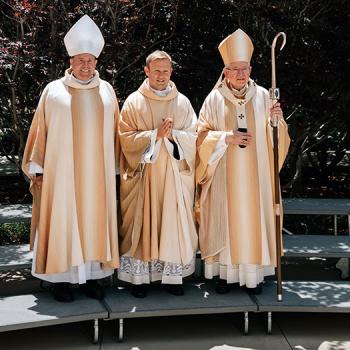 I read an article last Wednesday on Pantheon that offended me. It offended my sensibilities as a priest and it offended my sense of respect as a devotee of the Gods. It seemed impious and I cheerfully told the author so. Yet, in retrospect, I kind of understand where she was coming from and I have to wonder if ten or fifteen years ago, I wouldn't have written something similar without ever realizing why it might be problematic or the ways in which my own innocent ebullience in the most important set of relationships in my life (those with the Gods) might be misconstrued.
I read an article last Wednesday on Pantheon that offended me. It offended my sensibilities as a priest and it offended my sense of respect as a devotee of the Gods. It seemed impious and I cheerfully told the author so. Yet, in retrospect, I kind of understand where she was coming from and I have to wonder if ten or fifteen years ago, I wouldn't have written something similar without ever realizing why it might be problematic or the ways in which my own innocent ebullience in the most important set of relationships in my life (those with the Gods) might be misconstrued.
Those of us who consciously serve the Gods, who have vocations as priests, or callings as spiritworkers, or who are otherwise claimed by Them usually have very, very close interactions with certain of the Holy Powers. That's one of the joys (and sometimes, I'll admit burdens) of being a shaman or spiritworker, mystic or priest. Because of the closeness of contact, a certain informality often creeps into the relationship. I think this is normal and healthy. It's an outgrowth of the years of commitment and interaction, years of doing hard but immensely rewarding work, years of ongoing contact in various ways with specific Deities. The same thing happens in human relationships. We start out with Mr. and Mrs. X, Ma'am and Sir, and eventually move into first names and then sometimes nicknames. So far, so good.
Things get a bit stickier, however, when we carry that intimate informality over into the realm of public discourse. Language is a very powerful thing. It shapes experience and our comprehension of what is possible. Moreover it shapes our comprehension of what is proper. Anyone writing and speaking publicly about their faith runs the risk of being perceived by newcomers as "an authority" or "an expert." It's a dismayingly small leap from ‘expert' to ‘teacher.' A blog is a public forum. Newcomers who do not know our Gods, who may be desperately hungry to find the "right" way to develop a relationship with the Gods, to have some sort of spiritual experience, to have the connection that I think some of us sometimes take for granted, may all too easily latch onto our own flippant words as a guide for their own behavior. They may not have the context to understand that the way each of us approaches the Gods, and any informality in the expression of that relationship, stems from years and years of service. I believe we need to craft our words very carefully, with an eye toward the impact they may have.
I have a colleague owned by Baphomet. She routinely refers to Him as "Butthead." And there's a world of affection, love, deep connection, history, and pain behind that. She has earned the right to call Him that. I would never, ever presume to do the same. I don't have the same type of relationship with Him as she does. I occasionally and always tongue-in-cheek refer to Odin (the God who owns me) as "the Old Bastard." I love Odin dearly and in no way mean any disrespect; and I avoid speaking so flippantly in public precisely because it could be misconstrued. (And I ask His forgiveness for doing so here. I merely wished to illustrate my point.) That is a mode of expression reserved for Him or for others who are owned by Him in the intimacy of our private conversations.
I recently re-watched the movie Fiddler on the Roof (great movie, by the way) and in this musical, a very devout milkman named Tevye argues with God regularly and with quite a bit of salt. It's charming and easily conveys the deep respect and love that the character has for his God. However, you'd never see this character speaking of God that way before a rabbi, or in temple, or before Gentiles. It simply wouldn't happen—especially before Gentiles. Think about it: I argue with my sister all the time and we've been known to call each other horrible names in private, but I wouldn't ever call her workplace and ask to speak to her using one of those names. It wouldn't be appropriate (not to mention she'd probably kill me!).
Language is a funny thing. It has layers and permutations and there isn't ever really just one language for a given tongue. English is my mother tongue but there's the English that I speak at home with family and friends, the way in which I speak to coworkers and superiors, the language I use in speaking to students, and the way in which I speak to my most intimate acquaintances. On top of all of that, there is the written equivalent of all those modes of expression. There are layers and each one possesses its own hierarchy and syntax and vocabulary. The way I speak to my boss would be inappropriate with my lover, and the way I speak to my students would be inappropriate with a friend. So many of us in contemporary society have forgotten (or given the state of American education maybe never even learned) that part of being a responsible and intelligent human being means gauging your language to your audience and adjusting your vocabulary and speech patterns to whatever is appropriate to your listener. I may cuss like a sailor in regular discourse with my sister but I'd never dream of doing so before a class full of students! The same dynamic holds, or should hold true for spiritual writing.





